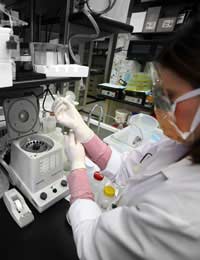DNA Testing and Genealogy

In spite of all you may have been led to believe, DNA doesn’t have all the answers about genealogy. You won’t be able to take a DNA test and come up with an instant Family Tree.
But there are interesting things that DNA can tell you, some of which can prove quite surprising. It can give very strong indications of your ethnic origins, discover if two people share a common ancestor or are related, and if you’re related to others who share your surname. That, when you think about it, is quite a lot.
One thing DNA testing has proved is that all Europeans are descended from one of seven women, known as the “seven daughters of Eve”, who lived 40,000 years ago.
Taking DNA Test
With home tests available and relatively cheap, anyone can do a DNA test. You buy a kit, take a swab from inside your cheek, and send it to the company selling the kit. A few weeks later you receive your results.What you get depends on the type of test. There are two tests possible, mtDNA and Y Line. The first shows mitochondrial DNA, which is only passed from the mother. From that you can learn about a shared female ancestor with someone else, although establishing a date for that ancestor is largely impossible.
The Y Line test only works with males, since the Y chromosome is passed from father to son. It can establish if you’re related to someone with the same surname, or related to another person. The more “markers” in your test, the greater the amount and preciseness of the information you’ll receive.
Both tests offer markers that can give indications as to your ethnic background, determined by the haplogroup.
Linking DNA Test Results to Ancestors
By themselves, DNA test results don’t tell you a great deal. It’s more the questions you ask that are important, and how the results check against other results and established databases.The ideal thing is to have several members of your family – or, even better, people you think might be family – all submit to DNA testing, and discover if you’re linked. That could determine a possible link between, say, the Shropshire Smiths and the Yorkshire Smiths, whether you share a common ancestor (referred to as most common recent ancestor, or MCRA). The greater the number of people taking part, the better the sample, obviously, and the more likely you are to establish meaningful results and answers to your questions.
Some companies do have databases with results available and you might be a close match for some people, and that means you could contribute to each other’s family trees. There might well be others with a match, but not as close.
Finding a Testing Lab
The problem isn’t so much finding a testing lab as finding the right lab. Home DNA testing has become quite commonplace these days, both in the US and here. For around £200 or less, you should be able to find a test.You’d do better to deal with a British lab. Not only is it closer, but any database it has will be British as opposed to American. You’ll also need to select which test you want, and that depends largely on what you’re trying to establish.
- The Importance of Wills in Genealogy
- Family History: How Far Back Can You Go?
- How Record Keeping Changed in the 19th Century
- How to Make Use of Genealogy Reference Books
- What Genealogy Qualifications Can You Obtain?
- Becoming a Professional Genealogist
- Why Does Family History Fascinate Us?
- How to Make a Family Tree
- Family History: What Do You Want To Learn?
- Genealogy Problems You May Enounter In Your Family History Search
- Organising Your Family History Data
- Preparing To Trace Your Family Tree
- Where To Begin In Researching Family History


Re: Maiden Names in Genealogy
Hi. Nice forum. Searching for key help. Thanks:)
Re: Maiden Names in Genealogy
Kak esehiko sminor k112 exploregenealogy.co.uk
Re: Using Criminal Records For Family History Research
Trying to find dads past history with arrests just out of interest as hes recently passed away and…
Re: Using Criminal Records For Family History Research
Hi all i wanted to find out about my dad's past and nobody seems to know much about it or what he did.…
Re: Maiden Names in Genealogy
Looking for my fathers mother maiden name
Re: Genealogy and a Criminal Past
I am trying to find out about my father crime in 1992 or 1993 my father as pass away 1998 and I would like to find out why he got…
Re: Using Criminal Records For Family History Research
I am trying to find my biological father's police criminal record as I was abused as a child but have…
Re: Cremation Records and Tracing Your Family History
I am trying to find out where has my friends aunt Adelinda Diaz McMullen was cremated and who was her…
Re: Cremation Records and Tracing Your Family History
CAN SOMEONE PLEASE HELP ME WITH TRYING TO FIND OUT WHERE MY FATHER WAS CREMATED/BURIED IN KENT UK. I…
Re: What If You Have Asian Roots?
Ancestor Edward Albert Wells was born in Trichinopoly on 8 May 1833 to his father George Wells of the 54th Regiment at Foot and…